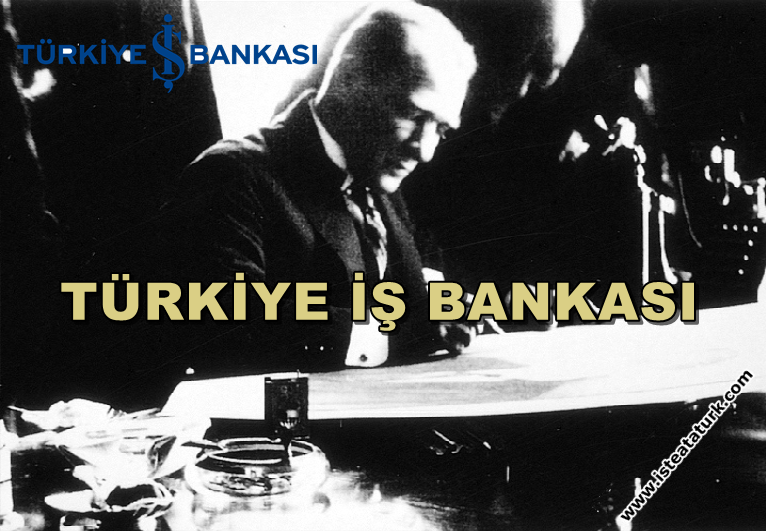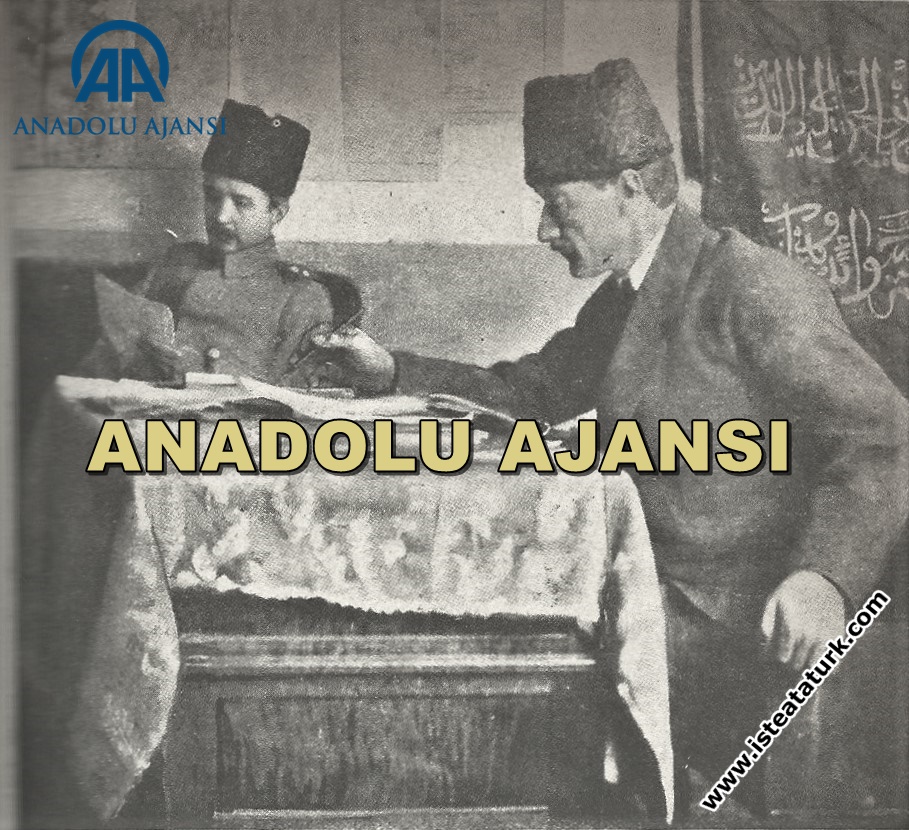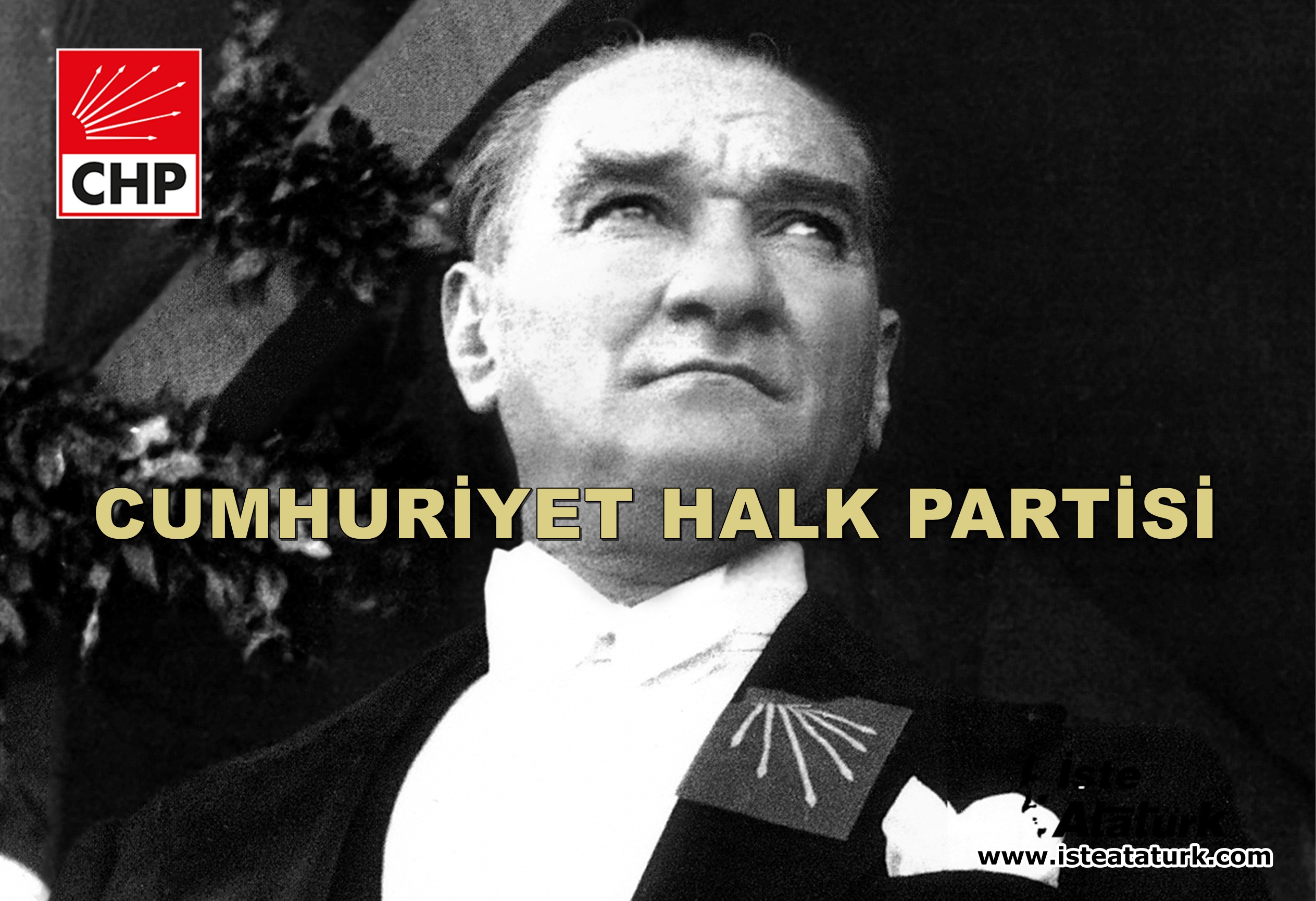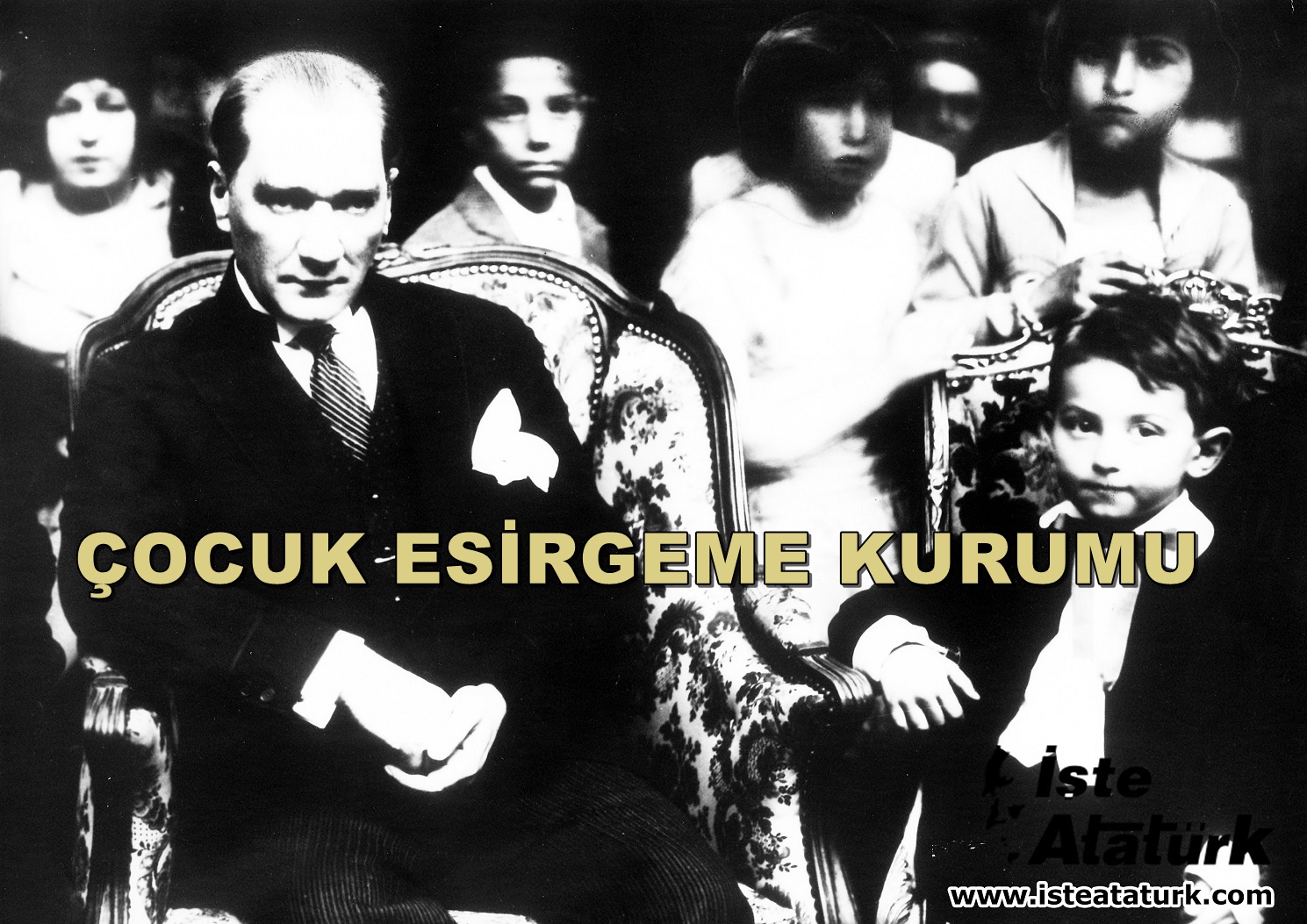
İşbank of Turkey
Character Size
"... Establishing a fully modern and national bank, born directly from the reputation and trust of the people, as the head of the measures to save and elevate the homeland"... Mustafa Kemal Atatürk
I
ESTABLISHMENT OF İŞBANK
Let's read the banking studies in Kazım (Özalp) Pasha's memoirs:
Although the Ottoman Bank helped us a lot during the National Struggle, Mustafa Kemal Pasha did not consider it a full national bank and saw the establishment of a new national bank as beneficial. Ziraat Bank, which was founded in 1863, was described as a bank established for the development of agricultural business due to its characteristics. Opinions against the new bank requested by the Pasha were generally agreed upon that we do not have a qualified staff to manage a new bank to be established. The experience was low, the money to be deposited in the newly established bank could go bankrupt. Mustafa Kemal Pasha, who thought that a solution could be reached with a staff of Turkish officials working in the Ottoman and Ziraat Bank, was determined to establish a new national bank.1
The rest of the money sent to Mustafa Kemal from India in order to help the National Struggle was deposited in the Ottoman bank. When Atatürk announced his wish to become a partner in the Ottoman Bank with this money, the aforementioned bank took a turn-of-the-mill attitude.
Falih Rıfkı describes the event as follows:
One of the foreign banks:
“Can we become a partner in your bank with our hundred thousand liras you have?” When he answered the question that it was unnecessary for the Turks to deal with these matters, Mustafa Kemal immediately withdraws the hundred thousand liras from the bank, puts it in a bag in the shop in Kasaboğlu bazaar, and puts a guard in front of it. This is the basis of official and private national banks, whose capitals now exceed hundreds of millions. 2
During the last visit of President Mustafa Kemal Pasha to Uşakizade Mansion, it was decided to establish Turkey's first national bank.
Let's listen to the establishment story of İşbank in Celal Bayar's memoirs:
Mustafa Kemal Pasha had 250 thousand liras in the Ottoman Bank. He was not even paid interest on deposits there. Indian Muslims sent the money to the person of Gazi during the years of National Struggle. Gazi also gave the money to the Ministry of Finance so that it could be spent on the needs of the army. After the victory, while all the debts taken from the people were paid, Gazi's money was also given back. He took it and deposited it in the Ottoman Bank. Gazi's father-in-law, Muammer Bey, was the biggest merchant of İzmir at that time. The only Turkish trader who also has an interest in Europe. He said to Gazi, "Let's run this money". Gazi said: "Go to our Celal, talk to him, I don't know about these things."
Mr. Muammer came to me... Then I saw it as a condition for our people to have a bank ourselves, to establish a bank where our people would be comfortable and in a way that both sides could understand each other. And I said to Mr. Muammer, “An export company is also necessary, but this job is more important”. I also stated that I personally did not like the fact that Gazi's name was included in this trade… 3
In an interview with Vecihe Hanım, Muammer Bey's youngest daughter, in the Ayşe Sultan Grove in 1987; Stating that he witnessed the speeches made in the mansion about the establishment of İşbank, he tells the following as the only living eyewitness:
Mustafa Kemal Pasha used to work in his private room in the Selamlik part of our house in Izmir. Gazi often met with the ministers in the study. Celal Bey was also one of the ministers he called frequently. Another day like this, Celal Bey first met with Gazi in his study, and then he came to us. We; Latife, my sister, me and my father were sitting in the Selamlık section. This building I mentioned now operates as a Private Turkish College. I have heard with great pleasure that this place will be organized as Latife Hanım Museum in line with the directives of our President Kenan Evren. Yes, in this building, there was a discussion between my father and Celal Bey on how to evaluate Gazi's 250 thousand liras. My father reminded that exports and imports were done by foreigners and suggested the establishment of a Turkish company that would do these things. Reminding that the banking business is also in the hands of foreigners, Celal Bey said that it would be beneficial to establish a bank. In the end, they came to a consensus. In my mind like today, it was a beautiful evening. Later, Gazi also came out of the study and came to us.
I do not know that my father was among the founders of your bank. I have not seen the founder's stock until today. But, whenever my father goes to İzmir, he always stops by the Manager of İşbank and talks to him. He would receive information about the development of the bank. He would monitor the status of the bank as much as he could from Izmir.
The decision to use President Mustafa Kemal Pasha's money by establishing a “National Bank” becomes final by founding İşbank at the meetings held in Ankara. At the Council of Ministers meeting held on 20 August 1924, President Mustafa Kemal Pasha:
He declares his decision by saying, “At the beginning of the measures that will save and raise the country, to establish a fully modern and national bank, which is born directly from the reputation and trust of the people...”. The first national bank to be established is called “İş Bankası”. Celal Bayar, who resigned from the Ministry of Finance, was appointed as the first General Manager. Making its first official application on August 26, Victory Day, İşbank was officially inaugurated on September 9, 1924, with a special ceremony held in its first building on Ankara İstasyon Caddesi.
It is known that 600 thousand gold liras, which were given to Gazi Mustafa Kemal by the Muslims of India, were spent in the War of Independence. By the decision of the Council of Ministers of the Republic of Turkey; 250 thousand liras of this money was returned to Gazi Mustafa Kemal by saying 'This is your money'. When İşbank was established, this money was used as the main money.
What Atatürk said to the members of the Board of Directors of Türkiye İş Bankası during the evening conversation on 26.08.1924:
“Don't be discouraged by the scarcity of capital! The strongest capital for such institutions is intelligence, attention, chastity; is to know the technical and methodical work. Stick to work with this belief, you will surely succeed! ... If you make success in this business more a matter of national pride and honor than a matter of personal honor, you will find plenty of fire and energy in your hearts that you need to work, to reach your goal and to rise even higher!” (Cumhuriyet Newspaper 27.8.1934).
Source: Atatürk's Diary with Bibliography From His Birth To His Death Prof. Dr. Utkan KOCATURK
1 Kazım Özalp, Teoman Özalp, Memories from Atatürk, İş Bankası Ankara 1994, p. 30
2 Mazhar Leventoğlu, Atatürk's Testament, Bahar Printing House Istanbul 1968, p. 78
3 History of İşbank, Istanbul 2001, p. 4-7
II
Celal Bayar, the First General Manager of İşbank:
"Atatürk is told one day about the difficulties of foreign banks in lending in national matters. He decides to establish a national bank. A man is considering this job, he calls one of his relatives:
- I am thinking of Deputy Minister of Economics Celal Bey to head this bank I will establish. What does he say? The interlocutor:
- Sir, Celal Bey is so dependent on you that he will do whatever you order without hesitation, he replies. Ataturk:
- I have a lot of confidence in his morals. But you don't mention me, he says, check a pulse. This person finds Celal Bey. Even though it might seem a little strange to leave a job as the Deputy of Economy and start a job in a newly established bank with three or five rooms at that time, Celal Bey said to his interlocutor:
"I am a soldier under his command, I will serve wherever he orders," he replies. A time passes. Atatürk calls Celal Bey and this time opens the issue directly to him. Celal Bey repeats that he will do whatever he orders. This time Ataturk:
- But it will be necessary to leave the Deputy, he says. Atatürk goes further this time:
- You will have to leave the deputyship.
- I'll let you go, Pasha...
At that time, Atatürk grabbed Celal Bey's shoulder:
- Come on, get to work, you'll see, you'll be successful, he says, and adds the following words:
- You have all the qualities you need for this job. I indifferently trust your honor and morals."
Source: Munir Hayri EGELİ
III
Isbank of Turkey
The proposal of Muammer Bey, the father of Atatürk's wife, Latife Hanım, to establish a company to import and export, accelerated the establishment of İşbank. Celâl Bayar, who was the Deputy for Population Exchange and Reconstruction and Settlement at that time, describes the establishment of the bank as follows: "I was the deputy for the development. The exchange of people was difficult. One day, Atatürk's father-in-law, Uşaklızâde Muammer Bey, came to me. He said that he and the veteran had 250 thousand liras, they wanted to do import and export business with it, but His Holiness Gazi asked Celâl Bey once. . I thought that import and export business might be too risky. When I was working at a bank, I heard that Turkish traders took advantage of foreign banks. I thought that establishing a bank with a capital of 1 million with 250 thousand liras would actually be a public service. I made this suggestion to Mr. Muammer.”1 Celâl Bayar was appointed as the first general manager of the bank. Atatürk himself chose the members of the board of directors after the general manager from among the reliable people and close friends of that period.
The first important initiative in banking started with Türkiye İş Bankası, our first national commercial bank. Türkiye İş Bankası was established on August 26, 1924 as a joint stock company with a capital of 1 million TL. The first 25% of the capital was paid by Mustafa Kemal Atatürk.
250,000 of the bank, which was established with a capital of 1,000,000 lira, was provided by Mustafa Kemal Atatürk from the money sent by the Muslims in India during the War of Independence.2 In addition, some donations to the Republican People's Party were deposited into this account in the bank.3
The first bank branch went into operation on 30 August 1924 with a ceremony. Atatürk stated the decision regarding the establishment of Türkiye İş Bankası to the Executive Board of Deputies convened in Çankaya with the following words: "...As the leader of the measures to save and elevate the homeland, it is a fully modern and national bank that was born out of the direct reputation and trust of the people. set up"...4
Türkiye İş Bankası was established as a joint stock company subject to the provisions of private law. However, the way the capital was provided and the selection of the executive staff gave İşbank the appearance of a public bank.
Türkiye İş Bankası undertook the duties of providing the loan needs of national institutions, promoting the development of savings and deposits in the country, and developing national banking. For example, he played an important role in the establishment of the sugar industry, the development of the weaving industry and the operation of Zonguldak coals.
In accordance with its founding purpose, Türkiye İş Bankası has made an important contribution to the economic development and industrialization of the country, and has made various investments for this purpose. In addition, it was the first bank in the country to implement the bonus and piggy bank system to encourage savings, and to bring traveler's checks.
Türkiye İş Bankası developed in a short time. It has become the first institution that the public gives priority when investing their savings and businessmen apply when looking for a loan. In the money and credit market, foreign financial intermediaries gained dominance over banks. It made the people accustomed to banks. He brought national banking to the country. He also played an important role in the birth and development of new credit institutions. In the early years of the Republic, it encouraged and patronized small savings, which was very important. He founded companies in the field of industry and insurance (Anadolu Sigorta in 1925) and invested money in subsidiaries. Established Cam Şişe ve Sanayii in accordance with the First Industry Plan; Together with Sümerbank, he established the Malatya Cloth Factory; He contributed to the establishment of Isparta Rose Oil Facilities. He invested capital in some banks that were established before and will be established later.
Derya Bozoklu
1 M. Akif Tural, supra, p. 93, 94.
2 S. İlkin - İ. Tekeli, supra, p. 187.
3 This money, sent by Indian Muslims to Mustafa Kemal Atatürk's own name, was used as the founding capital of Türkiye İş Bankası, which made great contributions and services to Turkey's economic life. See. Aptekin Müderrisoğlu, Financial Resources of the War of Independence, Atatürk Research Center, Ankara 1990, p.564; Yaşar Aksoy, ibid, p.30, 31, 32.
4 Mustafa A. Aysan, Atatürkist Thought, "Atatürk's Economic View: Statism", Atatürk Research Center Pub., Ankara 1992, p.1015.
5 Yüksel Ülken, Atatürk and Economics The Problem of Efficiency in Economic Development and the "Eclectic Model", Türkiye İş Bankası Publications, Ankara 1978. p.86.
6 F. Ergin, supra, p.49; Öztin Akgüç, supra, p.157.
Source: ATATÜRK RESEARCH CENTER JOURNAL, Issue 55, Volume: XIX, March 2003
IV
On the 10th anniversary of the establishment of Türkiye İş Bankası (August 26, 1936):
"The institution of İşbank will take its own place in the history of the Republic in terms of economy. This institution, in a short time and at most, in the face of all kinds of reform difficulties of a brand new state institution, will bear the great consequences of not dedicating even a very small wealth to the benefits of the individual in economic life but to the benefits of the nation. He has shown it by applying it in a way that covers the world.”
Mustafa Kemal Atatürk
Source: Türkiye İş Bankası, Kuruluşu, Çalışmaları, Eserleri, Ankara 1942, s.7



